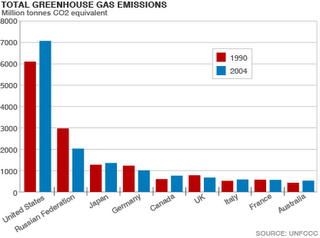The snappily titled United Nations Framework Convention on Climate Change (UNFCCC), just to rub the point in, have just published statistics about the rise in CO2 emissions.
Guess who is topping the list and, by the way, who is least likely to do anything about it?
 There was a 2.4% total increase in emissions across 41 industrialised countries between 2000 and 2004.
There was a 2.4% total increase in emissions across 41 industrialised countries between 2000 and 2004.Britain, France and Germany were relatively close to achieving Kyoto Protocol targets.
The United States, bless them, remained the world's biggest greenhouse gas polluter - its emissions increased by a staggering 15.4% between 1990 and 2004.
Unfortunately, the situation in the US, according to Al Gore, is this:
"In the last six years, we've seen an energy bill written by oil companies, a prescription drug bill written by pharmaceutical lobbyists, and a global warming policy run by the biggest polluters. Only in the out-of-touch world of this Republican Congress could public service mean raising their own pay nine times without raising the minimum wage once."
The last sentence I included because it so typical of conservative politicians. I seem to remember the same thing happening here in the UK, during the Thatcher/Major years - while clamping down on the public sector pay, the government kept awarding themselves inflation-busting wage rises. But I digress...
For additional information see:
The UNFCC




